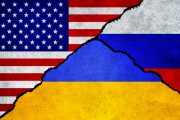
Glenn Greenwald, scourge of progressives and neocons alike, has nailed David Frum, the former speech writer for President George W. Bush, on his deviations and explanations of the motivations behind the the decade-long Iraq War.
To say the misleaders were themselves misled would be an understatement, since the evidence shows that, for the most part, they were willingly misled. What can you say in defense of the “intelligence” agency of the world’s greatest superpower, and the government relying on that agency’s information, when both were misled by a source the agency itself had code-named “Curveball”? Wouldn’t that name itself indicate that the high-level operatives of our CIA had a pretty good idea that this allegedly valuable source of “intelligence” wasn’t pitching the info straight to them?
In a March 18 article for Newsweek’s online publication, The Daily Beast, Frum, who had previously boasted of his insider status as the author of the famous “axis of evil” line in the Bush State of the Union address in 2002, protested of how little influence he had in evaluating Ahmed Chalabi, the U.S. and U.K. choice to head the government of Iraq, once the country had been liberated by the military might of the U.S.-led coalition. Chalabi turned out to be another “Curveball.” But don’t blame Frum, who now protests that he wasn’t that much of an insider:
I was less impressed by Chalabi than were some others in the Bush administration. However, since one of those “others” was Vice President Cheney, it didn’t matter what I thought. In 2002, Chalabi joined the annual summer retreat of the American Enterprise Institute near Vail, Colorado. He and Cheney spent long hours together, contemplating the possibilities of a Western-oriented Iraq: an additional source of oil, an alternative to US dependency on an unstable-looking Saudi Arabia.
Greenwald, writing for the Guardian of the U.K., reached back in time to pull up a passage from an article Frum wrote for National Review in 2004. Compared to other possible leaders of Iran or, indeed, other leaders in the Arab world, Frum wrote at that time, “the imperfect Ahmed Chalabi, is, nonetheless, a James bleeping Madison.”
Greenwald recalled how stigmatized and marginalized were critics who suggested during the run-up to the Iraq War, and during the war itself, that the principal motivation for the invasion and occupation of Iraq was Baghdad’s considerable stockpile of oil reserves, second only to Saudi Arabia’s. That was beyond the pale of responsible dissent, according to President Bush himself. The president, who had speculated aloud about how much easier his job would be if only he were a dictator, generously allowed room for dissent he deemed responsible:
Yet we must remember there is a difference between responsible and irresponsible debate — and it’s even more important to conduct this debate responsibly when American troops are risking their lives overseas.
The American people know the difference between responsible and irresponsible debate when they see it. They know the difference between honest critics who question the way the war is being prosecuted and partisan critics who claim that we acted in Iraq because of oil, or because of Israel, or because we misled the American people. And they know the difference between a loyal opposition that points out what is wrong, and defeatists who refuse to see that anything is right.
Bush was saying that it is acceptable to criticize the way the war is being conducted, but not to question the decision to go to war or the reasons underlying that decision, especially “when American troops are risking their lives overseas.” Once the president sends American troops to war, according to Bush, he thereby shields himself from “responsible” questioning and criticism over why he sent them there. And to charge that the motive was oil is specifically ruled out of bounds.
As Frum has belatedly acknowledged, during the long hours Vice President Cheney spent in consultation with the aforementioned Chalabi, the resource the two were discussing was not the abundance of microchips in Silicon Valley. It was the vast inventory of oil reserves in Iraq and how they might be exploited to the mutual benefit of the United States and Iraqi government headed by Chalabi.
Administration officials, after all, predicted that a liberated Iraq would be able to pay for the war and the reconstruction of the country through oil revenues. And once that oil and those revenues were liberated from Saddam’s tyrannical hand, would it not stand to reason that Iraq’s new government would sell large amounts of that oil to the United States at prices we could certainly, well, influence?
There is a pattern being followed here that appears to be a reprise of our post-World War II reconstruction of Europe through the Marshall Plan that, while it may have worked wonders for the war-devastated nations of Europe, had the not-coincidental benefit of facilitating the establishment of long-lasting markets for American goods and services. And as was the case with the postwar realignment, it appears the United States has undertaken a new Cold War, with the Arab world cast in the role of the old Soviet Union. The only difference is today’s statesmen have neither the long-range view nor the patience of the Truman, Eisenhower, or Kennedy administrations and have ruled out containment as a strategy for dealing with Iran’s nuclear capability.
The very capability, never mind actual nuclear weapons, must not be tolerated, according to tough-talking hawks of Washington and Jerusalem. Iran, which has not started a war since the glory days of the Persian empire, must not be allowed weapons of mass destruction. So says the current ruler of the American empire, which with two atom bombs flattened the cities of Hiroshima and Nagasaki to hasten the surrender of an already defeated Japan.
The little boy in the fairy tale who cries out the obvious truth about the emperor’s new clothes was surely not David Frum.

